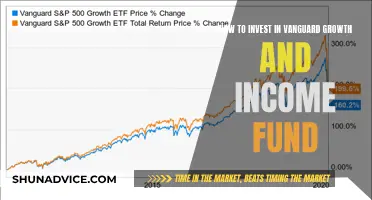
Investing in mutual funds is a popular way to gain exposure to a wide range of stocks, bonds, and other securities. They are a relatively safe investment option, offering diversification and reduced risk when compared to investing in a single stock or bond.
Mutual funds are managed by professionals, who invest in a variety of securities to offset potential losses. They are also highly liquid, allowing investors to easily buy and sell units. Additionally, mutual funds are regulated, adding a layer of safety and transparency.
However, it's important to consider the fees associated with mutual funds, such as management fees and expense ratios, which can impact returns.
1. Decide between active and passive funds: Active funds are managed by professionals aiming to beat the market, while passive funds aim to mimic the market and often have lower fees.
2. Calculate your budget: Consider the minimum investment amount and how much money you are comfortable investing.
3. Choose a brokerage: You can buy mutual funds through an online brokerage, directly from the fund company, or with a financial advisor.
4. Understand fees: Mutual funds have expense ratios, which represent the annual fee for fund management. Be sure to also look out for other fees, such as transaction fees and front- and back-end loads.
5. Manage your portfolio: Consider rebalancing your portfolio annually to maintain your diversification strategy and avoid chasing short-term performance.
| Characteristics | Values |
|---|---|
| Investment type | Stocks, bonds, or other securities |
| Investment objective | Depends on the fund's prospectus |
| Risk | Lower than investing in a single stock or bond |
| Management | Experienced professionals |
| Diversification | Across multiple sectors/assets |
| Regulation | Securities and Exchange Board of India (SEBI) |
| Transparency | Regular disclosures on portfolio holdings and performance |
| Fees | Low investment and management fees |
| Liquidity | High |
What You'll Learn

Understand the risks
When investing in mutual funds, it's important to understand the risks involved. Here are some key points to consider:
- Market Risk: Mutual funds are subject to market risk, which means that their performance is tied to the overall stock market and economic conditions. Factors such as changes in policy, macroeconomic conditions, pandemics, and investor confidence can all influence the value of your investment. It's essential to carefully review the fund's documents and seek professional advice before investing.
- Diluted Returns: Due to regulations, mutual funds cannot have concentrated holdings exceeding 25% of their portfolio. This diversification is intended to reduce risk, but it can also lead to diluted returns. Some stocks may perform exceptionally well, but their impact on the overall fund may be limited due to the diversification requirement.
- High Fees: Mutual funds typically charge various fees, such as management fees, annual expense ratios, load charges, and front- and back-end sales loads. These fees can eat into your returns and make mutual funds a less attractive investment option. It's important to carefully review the fee structure before investing.
- Lack of Control: With mutual funds, you are entrusting your money to fund managers who make the investment decisions. This lack of control may be uncomfortable for investors who prefer to actively manage their portfolios and handpick their investments. Some mutual funds may also deviate from their stated investment objectives, making them unsuitable for those seeking consistent portfolios.
- Liquidity and Lock-in Periods: While mutual funds are considered highly liquid, certain types of funds, such as certificates of deposit (CDs) and Series I savings bonds, have lock-in periods. Withdrawing your money before the maturity date often incurs early withdrawal penalties or a loss of interest. It's important to consider your investment horizon and ensure it aligns with the lock-in periods of the mutual fund.
- Inflation Risk: Some mutual funds, particularly those focused on fixed-income investments, may not provide returns that outpace inflation. Over time, this can lead to a loss of purchasing power, and your investment may not grow in real terms. It's important to consider the potential impact of inflation on your investment returns.
- Default Risk: Mutual funds that invest in bonds or corporate debt carry the risk of default. While governments typically pay back their debt, companies can go bankrupt, resulting in losses for bondholders. It's crucial to assess the creditworthiness of the issuers and consider the potential impact of defaults on your investment.
Strategies for Investing in JP Morgan's Hedge Fund
You may want to see also

Research your fund
Researching a mutual fund before investing is an important step in ensuring that it aligns with your financial goals and risk tolerance. Here are some key considerations to help guide your research:
Investment Objectives and Risk Tolerance
Firstly, define your investment objectives. Are you investing for retirement, a house purchase, or a shorter-term goal? Each of these scenarios calls for different investment approaches and asset classes, leading to different categories of mutual funds. For example, if you're investing for retirement, you'll likely want to focus on funds with strong long-term growth potential, whereas a more conservative, lower-risk option might be preferable for a short-term goal. Understanding your risk tolerance is crucial, as it will help you determine how much volatility you're comfortable with in your investment portfolio.
Fund Performance and Manager Tenure
When evaluating a mutual fund's performance, look at its five- and ten-year returns rather than shorter-term metrics. While past performance doesn't guarantee future results, it can be a good indicator. Additionally, consider the tenure of the fund manager, especially if the fund has strong long-term returns. If the current manager has only been with the fund for a short time, they may not be responsible for its historical performance.
Fees and Costs
Fees can significantly impact your investment returns, so it's important to understand the various fees associated with mutual funds. The expense ratio, which represents the ongoing fees charged by the fund manager, can eat into your returns over time. Generally, it's advisable to stick with funds with expense ratios below 1%. Additionally, watch out for front-end or back-end load fees, which are sales charges applied when you buy or sell shares in the fund. No-load funds, which don't charge these fees, are preferable, but they may be hard to find.
Fund Prospectus and Disclosure Documents
Thanks to the Investment Company Act of 1940, mutual funds are required to disclose various information to investors. Before investing, be sure to read the fund's prospectus, which will outline its holdings, financial conditions, objectives, investment strategies, and risks. Disclosure documents will also provide essential information about the fund's objectives, strategy, fees, and risks, helping you understand if the fund aligns with your investment goals.
Historical Performance and Consistency
While evaluating a mutual fund's historical performance, look for consistency in returns over different time frames (1-year, 3-years, 5-years). Compare the fund's performance to its benchmark index and peer group. Remember, past performance doesn't guarantee future results, but it can provide valuable context.
Best Funds to Maximize Your 401k Returns
You may want to see also

Diversify your portfolio
Diversification is a crucial aspect of investing, and it involves spreading your investments across various assets or sectors to reduce risk. Here are some detailed instructions on how to diversify your portfolio:
Diversify Across Different Asset Classes
Invest in a range of asset classes such as stocks, bonds, commodities, real estate, and more. Each asset class has unique risk and return characteristics, so combining them can help mitigate risk. For example, stocks typically offer higher potential returns but come with higher risk, while bonds are generally considered less volatile and can provide a cushion against stock market fluctuations.
Diversify Within Each Asset Class
Even within each asset class, you can further diversify your investments. For instance, if you're investing in stocks, consider a mix of large-cap, mid-cap, and small-cap companies across different sectors like technology, healthcare, and consumer goods. This ensures that your portfolio isn't overly exposed to the performance of a single company or industry.
Consider Mutual Funds for Easy Diversification
Mutual funds are an excellent way to achieve instant diversification. By investing in a mutual fund, you gain access to a diversified portfolio of stocks, bonds, or other securities selected and managed by professional fund managers. This is especially beneficial if you don't have the time or expertise to build your own diversified portfolio from scratch.
Geographic Diversification
Don't put all your eggs in one geographic basket. Consider investing in international markets and emerging economies to spread your risk and take advantage of global growth opportunities. This can be easily achieved through international mutual funds or exchange-traded funds (ETFs).
Regularly Review and Rebalance Your Portfolio
Diversification isn't a "set it and forget it" strategy. Markets and economies are dynamic, and the performance of different assets and sectors will vary over time. Therefore, it's crucial to regularly review your portfolio to ensure it remains aligned with your investment goals and risk tolerance. If certain assets have grown significantly, you may want to rebalance by trimming those positions and allocating more capital to underperforming assets to maintain your desired level of diversification.
Invest in Evolve Funds Group Inc ETF: A Beginner's Guide
You may want to see also

Be aware of fees
Fees are an important aspect to consider when investing in mutual funds. They can eat into your returns over time, so it's crucial to understand the different types of fees associated with mutual funds. Here are some key points about mutual fund fees:
- Expense Ratio: This is the annual fee charged by the fund management company for operating the fund. It is expressed as a percentage of your investment and covers expenses such as management fees, administrative costs, and distribution fees. The expense ratio can vary significantly between different mutual funds, so it's important to review it before investing. Vanguard, for example, has an average expense ratio of 0.05% for its index mutual funds and ETFs, which is significantly lower than the industry average of 0.18%.
- Front-End and Back-End Loads: Mutual funds may also charge sales commissions, known as "loads." Front-end loads are charged when you buy shares in the fund, while back-end loads are charged when you sell them. Some funds have no loads, and these are usually the best deal for investors.
- Transaction Fees: In addition to the fees charged by the fund itself, your brokerage account may also charge transaction fees for buying or selling mutual fund shares. These fees can vary depending on the brokerage firm and the specific fund.
- Management Fees: The fund management company will typically charge a fee for their services, which is included in the expense ratio. However, it's worth noting that some funds may have higher management fees than others, so it's important to review the prospectus carefully.
- Other Expenses: Mutual funds may also incur other expenses, such as marketing and distribution costs, which are passed on to investors. These expenses are usually included in the expense ratio, but it's always a good idea to review the fund's prospectus for a detailed breakdown of fees.
When investing in mutual funds, it's essential to consider the impact of fees on your overall returns. While some fees are unavoidable, you can minimize their impact by comparing different funds and choosing those with lower expense ratios and no load fees. Additionally, working with a brokerage firm that offers a wide range of no-transaction-fee funds can also help reduce the overall fees you pay. Remember, even small differences in fees can add up over time and significantly affect your investment returns, so it's worth doing your research to find the most cost-effective options.
Invesco Funds: A Guide to Getting Started with Investing
You may want to see also

Know when to buy and sell
Knowing when to buy and sell mutual funds is an important part of investing. Mutual funds can be bought through an online broker or directly through the company managing the fund. Unlike stocks, which can be bought and sold at any time during the trading day, mutual funds can only be bought and sold after the market closes at the fund's net asset value (NAV). Mutual fund shares are purchased and redeemed directly from the fund.
When deciding when to buy and sell mutual funds, it's important to keep in mind that mutual funds are typically meant to be held as long-term investments. While some funds, such as money market mutual funds, can be held for short periods of time, stock mutual funds are generally intended to be held for the long term. Buying and selling mutual funds too frequently can result in higher fees, which can eat into your investment returns.
- Trade and settlement dates: The trade date is the date you place your order to buy or sell shares, but the settlement, or finalization of the trade, occurs a couple of days later. Since 2024, the Securities and Exchange Commission has moved to a "T+1" settlement cycle, meaning mutual fund trades are settled within one business day of the trade date.
- Fees: Mutual funds come with various fees that can impact your returns. Management fees, 12b-1 fees, loads (commissions paid to brokers), and other expenses can add up and should be considered when deciding when to buy or sell.
- Fund performance: If a mutual fund is underperforming compared to similar funds or relevant benchmarks, it may be a sign to sell. However, short-term fluctuations may not be a reason to sell, as mutual funds are geared towards long-term returns.
- Fund changes: Changes in the fund's management, investment strategy, or size could be a reason to sell. For example, if the fund's investment strategy shifts away from its original goals or if the fund grows too large to meet your investment goals, you may want to consider selling.
- Personal investment goals: Changes in your personal investment portfolio or risk tolerance may prompt you to sell mutual fund units and transfer your money to a more suitable investment. This could include rebalancing your portfolio to adhere to a specific asset allocation model or changing your investment strategy.
- Tax implications: Selling mutual fund units may have tax implications, such as capital gains taxes if the fund is held within a taxable account. It's important to consider the potential tax consequences before selling.
- Early redemption rules: Mutual funds are intended to be long-term investments, and selling shares within a certain timeframe (often within 30 days) may result in early redemption fees. These fees are meant to discourage frequent trading, as it can cause additional expenses and complexity for the fund's manager and other shareholders.
- Cost basis: When selling mutual fund shares, the cost basis you choose can impact your capital gains and losses. If the value of the fund has increased since your initial investment, you may have a taxable gain when you sell.
Smart Strategies for Investing $30,000 in Mutual Funds
You may want to see also
Frequently asked questions
Some safe mutual funds to invest in include the Vanguard Wellington Fund, Fidelity 500 Index, and the Vanguard Total Stock Market Index Fund.
Mutual funds are a popular investment option as they are run by experienced fund managers, provide diversification across multiple sectors/assets, and are highly liquid.
First, decide whether you want to invest in active or passive funds. Active funds are managed by professionals who pick investments with the goal of beating the market, while passive funds are more hands-off and often carry lower fees. Next, calculate your investing budget and decide where to buy the mutual funds. You can buy them through an online brokerage, directly from the company that created the fund, or through a financial advisor. Finally, understand the fees associated with the fund and make sure to monitor and review the performance of your investments periodically.
All investments carry some risk, but mutual funds are typically considered a safer investment than purchasing individual stocks since they hold many company stocks within one investment, providing more diversification.







